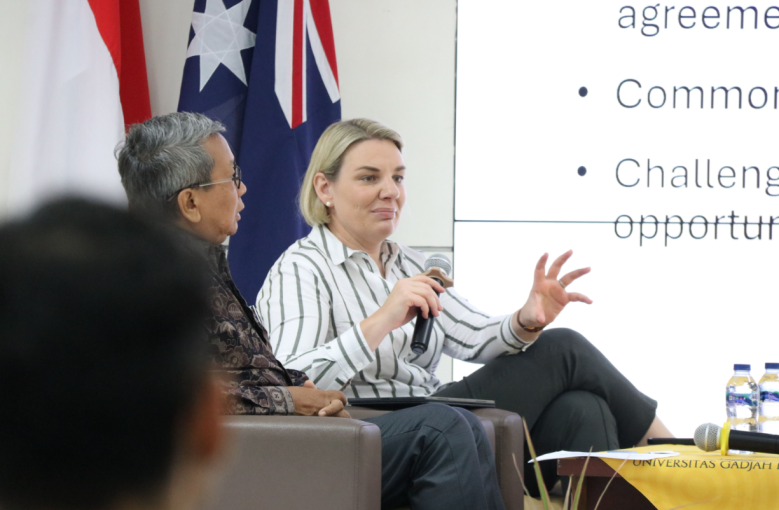
Yogyakarta, June 5th, 2024–Indonesia and Australia have a deep history in their diplomatic ties. To celebrate the diplomatic relationship that is 75 years strong, UGM’s Faculty of Social and Political Science collaborates with the Australian Embassy by organizing the #AussieBanget University Roadshow. The series of activities starts with the discussion panel with the theme “Harbouring Cooperation: Building a Stronger Maritime Future”. The activity was hosted on Monday (5/6) at the Mandiri Auditorium Fisipol UGM. The discussion session was led by Yulida Nuraini Santoso, Managing Director of the ASEAN Studies Center at UGM.
As a maritime nation, Indonesia and Australia have faced similar challenges and difficulties, such as illegal fishing, smuggling, international crimes, and climate change in the maritime domain. “Both of these countries are impacted significantly due to those issues. Moreover, the Islands of Indonesia have been passed through illegally by foreign ships, but there are no good security regulations in place,” said Jennifer Parker, an expert from National Security College, Australian National University. As written in the Social Development Goals 17 about Partnership for The Goals, Jennifer emphasized the importance of cooperation between two countries in facing those issues. Nevertheless, collaboration is not an easy thing to achieve. The difference between tradition and the many actors that have to be involved to solve maritime problems becomes homework for the countries to translate the framework into action, argued Jennifer.
In line with what Jeniffer has stated, Dafri Agussalim, the Executive Director of ASC UGM, agrees that cooperation between Indonesia and Australia in maritime security needs to be increased. According to him, even though the cooperation between Indonesia and Australia in defending its security in the Indo–Pacific area has been deemed to be successful, many non-traditional security threats like Transnational Organized Crimes have appeared. Transnational Organized Crimes threaten peace and security and it can even cause human rights violations. Every year, there are many lives taken due to these threats,” said Dafri. Moreover, Dafri explains that any security threats that occur in the Indo-Pacific region can have a negative impact not only on one country, but all the other countries. This is inline with the Social Development Goal 16, which talks about Peace, Justice, and Strong Organization.
The discussion was then continued by Ristian Atriandi Supriyanto, an International Relations lecturer from Universitas Indonesia. Ristian explains about the challenges and opportunities in cooperation between Indonesia and Australia in this era of the Neo-Cold War. One of them is the struggle to attain control of the sea, disruptive technologies, the sea that will be much more crowded with electromagnetic things, competitive interactions between countries, and a battlefield that is getting smaller and smaller.
